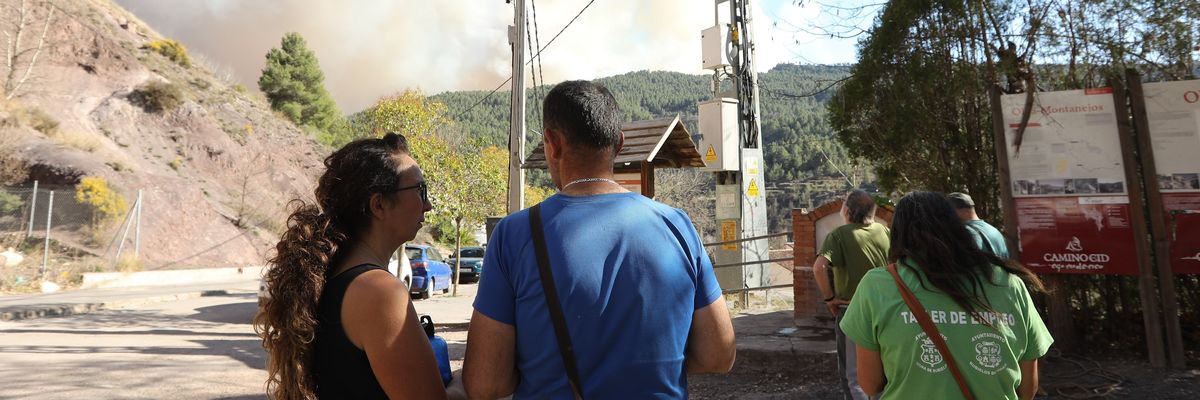A large wildfire raging in Spain's eastern Valencia region forced more than 1,500 people to flee their homes on Friday, providing further evidence of life-threatening consequences of the fossil fuel-driven climate crisis and bolstering the case for meaningful mitigation efforts.
Since it broke out in the municipality of Villanueva de Viver on Thursday, Spain's first major wildfire of the year has destroyed more than 7,400 acres of forest, prompting evacuation orders in eight communities across the Castellón province.
As residents sought refuge in shelters run by the Red Cross and other charities, more than 500 firefighters—supported by 18 planes and helicopters—were still attempting to contain the blaze on Friday afternoon.
"While firefighters believed they were managing to control the spread of the flames, strong winds and 'practically summertime temperatures' could reactivate it," Reuters reported, citing a local official.
"Summer is getting longer, it is arriving earlier, and the availability of water and humidity in the soil is unfortunately being reduced, making us much more vulnerable."
Ximo Puig, president of the Valencia region, told reporters the fire came "very early in the spring" and was "very voracious from the beginning."
It's not yet clear what sparked the blaze, but after months of arid conditions in the region, there's no shortage of dry fuel that can act as kindling. Climate scientists have long warned that as unmitigated greenhouse gas pollution causes temperatures to rise and droughts to worsen, wildfire seasons will grow longer and the number and severity of conflagrations will increase.
Speaking to reporters in Brussels, Spanish Prime Minister Pedro Sánchez said, "These fires we're seeing, especially this early in the year, are once again proof of the climate emergency that humanity is living through, which particularly affects and ravages countries such as ours."
According to Reuters, "An unusually dry winter across parts of the south of the European continent has reduced moisture in the soil and raised fears of a repeat of 2022."
Last year, wildfires destroyed nearly two million acres of land throughout Europe—more than double the annual average over the past 16 years, according to the European Commission. In Spain alone, 493 blazes wiped out more than 750,000 acres.
People in Spain, already suffering from a long-term drought marked by three years of below-average rainfall, are bracing for drier and hotter weather than usual this spring along the country's northeastern Mediterranean coast.
Experts have already started sounding the alarm about the likelihood of another catastrophic year for wildfires, especially if the frequency, duration, and intensity of heatwaves are comparable to last year, which saw records toppled.
"There is every reason to fear that this year too there will be numerous and widespread events."
"Out-of-season fires" are becoming increasingly common, Spanish Environment Minister Teresa Ribera told reporters this week. "Summer is getting longer, it is arriving earlier, and the availability of water and humidity in the soil is unfortunately being reduced, making us much more vulnerable."
Spain is far from alone. "A European Commission report this month observed a lack of rain and warmer-than-normal temperatures during the winter, raising drought warnings for southern Spain, France, Ireland, Britain, northern Italy, Greece, and parts of eastern Europe," Reuters reported. The commission "warned that low levels of water could affect strategic sectors including agriculture, hydropower, and energy production."
Lorenzo Ciccarese from the Italian Institute for Environmental Protection and Research told the outlet that "there is every reason to fear that this year too there will be numerous and widespread events."
The United Nations warned last year that as a result of planet-heating emissions and land-use change, wildfires are projected to increase 30% by 2050 and 50% by the end of the century.
After the Intergovernmental Panel on Climate Change released its latest assessment report this week, U.N. Secretary-General António Guterres said that limiting global warming to 1.5°C is possible, "but it will take a quantum leap in climate action," including a prohibition on greenlighting and financing new coal, oil, and gas projects as well as a phaseout of existing fossil fuel production.
